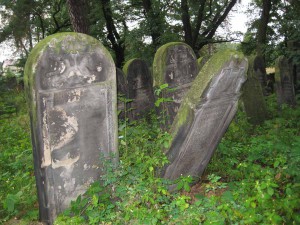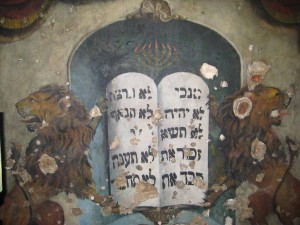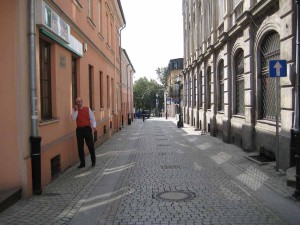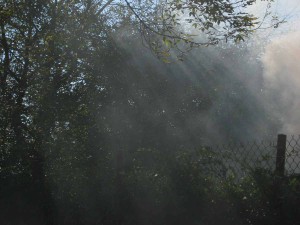Uncovering Roots
On my fifth visit to Poland, in the fall of 2010, I spent a few days in Piotrkow Trybunalski, an hour south of Lodz. Though Piotrkow was one of Poland’s oldest towns it was smaller and more sedate than Lodz, like the subdued parent of a flamboyant child.
During an afternoon visit to Piotrkow’s archive the previous spring, I’d retrieved a record of my maternal grandfather. Over the summer someone in Boulder had translated it and I’d learned that my grandfather had had a twin brother as well as three younger siblings with a different mother. With the new names and dates it provided, I could now expand my research to great grandparents and other family members. But all the records were handwritten in Cyrillic (Russian letters). It was no small task to locate them, and then for someone who could read Cyrillic to extract the desired information.
Before leaving Lodz, I emailed a prominent Jewish American lawyer I’d met at the Lodz Ghetto commemoration a year earlier to follow up on a conversation we’d had about my father’s home town of Kozienice. To my surprise he called my cell phone minutes later. When I happened to mention I was going to Piotrkow the next day, he interrupted me.
“Piotrkow? You’re going to Piotrkow? We just conducted a huge Shabbaton there in June. You must contact Jacek Bykowski. He doesn’t speak a word of English unfortunately, but he will help you.”
Minutes later, I was on the phone with Mr. Bykowksi who worked for the Piotrkow City government. Though I still stumbled miserably in Polish, I understood we would somehow arrange to meet later that week.
Beata’s aunt Grazyna, who spoke no English, had agreed to host me in Piotrkow, and her cousin, Jarek, who spoke a bit of English had offered to help out. The plan seemed shaky at best, but two days later Jarek and I greeted Mr. Bykowski in the hallway outside his office. Apparently busy with  meetings he handed us various publications and guides to Piotrkow’s Jewish past and, armed with this information, Jarek chauffered me to the major sites—first the Jewish cemetery whose caretaker was an old woman with very few teeth who lived in a crumbling house on the premises. The cemetery was hauntingly beautiful but in terrible decay, though some preservation work had been done.
meetings he handed us various publications and guides to Piotrkow’s Jewish past and, armed with this information, Jarek chauffered me to the major sites—first the Jewish cemetery whose caretaker was an old woman with very few teeth who lived in a crumbling house on the premises. The cemetery was hauntingly beautiful but in terrible decay, though some preservation work had been done.
Next we drove to the memorial site of a massacre in nearby Rakow forest where, on December 20, 1942, six hundred Jews were first herded into the Piotrkow synagogue, then taken to the forest, and shot. Piotrkow’s ghetto had the dubious distinction of being the first one established in Nazi-occupied Europe. Most of its inhabitants had already been deported and murdered at Treblinka two months before the December massacre. Though I didn’t realize it yet, I must have had family members murdered at Treblinka, and possibly here in Rakow forest.
 Finally we returned to the center of town and visited what was once the Great Synagogue of Piotrkow, established in 1792, now the premises of the town library. Between rows of children’s books on the second floor, we stood before the only remaining artifact—a painted mural of a Torah scroll riddled with bullet holes.
Finally we returned to the center of town and visited what was once the Great Synagogue of Piotrkow, established in 1792, now the premises of the town library. Between rows of children’s books on the second floor, we stood before the only remaining artifact—a painted mural of a Torah scroll riddled with bullet holes.
At the end of the day Jarek led me to a dim cave-like café. Once my eyes adjusted I was surprised to see Mr. Bykowski sitting there, waiting for us. Unbeknownst to me they had apparently arranged to meet. Jacyk Bykowski was a slim, elegant man with a soft-spoken presence. Jarek seemed more of a meat and potatoes guy, but they spoke like good friends though they’d met only that morning.
Though Jarek was supposed to translate, his English was not up to the task and he quickly gave up. At first I tried to follow what they were saying, but it seemed hopeless, so my mind drifted away from the struggle. Suddenly some words broke through and caught my attention. Jacyk told a story about a man who, in the process of remodeling his home, had found a collection of old photos inside a wall. A Holocaust survivor from Piotrkow later visited and identified the woman in one of the pictures as his sister.
Perhaps I was tired or had reached some mysterious quota of witnessed sorrow that day, but something about the story tipped an inner scale. Everything leading up to that moment, everything about my journey hit me—the tormented beings on the German train, the love I’d received on my first visit to Lodz, and the frustration of trying to experience it again. I’d hoped some piece of information would unlock a secret door or bring me closer to something I needed to learn, or to the ancestor Elizabeth had said was waiting to talk to me. But finally, where had it all led? I was in the dark, in this dim café, falling through space without a pilot.
I don’t know why I suddenly felt so vulnerable. I hadn’t felt much of anything when we first sat down. Perhaps it was my helplessness while these two Polish men tried to help me—helpless to understand anything until I did understand. I understood how that survivor felt to find a photo of his sister. A silent voice began crying from inside: Why can’t I find anyone? An irrepressible, unquenchable longing was breaking me apart. Suddenly I was in tears.
Jarek and Jacyk offered tissues with concern. Since I had a cold, maybe they assumed that was why I kept blowing my nose. I was too overwhelmed to tell. I was no longer hitchhiking in the dry landscape of the past, but carried by the current of a swelling river, not knowing where it was taking me. Something inside wondered where this crying was coming from. Was I crying? Or was someone crying out to me?
Finally Jarek took me back to his aunt’s warm home. Grazyna’s gentle presence was soothing, and her delicious mushroom soup was like medicine. Jarek had already taken a day off work to show me historical Jewish sites and meet with Jacyk Bykowski. The next day he planned to skip work again to help me at the archives. Their generosity touched me deeply.
That night I read about the history of Piotrkow in the materials given to me. The first known record mentioning the city dated back to 1217 after which Piotrkow  developed into an important seat of Polish courts and administration. Here knights assembled, decisions about war and peace were made, treaties were ratified, and kings elected. Apparently Piotrkow was more than the sleepy parent city of Lodz. It was an important seat of Polish power. Jews had arrived here as early as the Middle Ages and ulica Zydowska (Jewish Street) had existed from the 1620’s. I would soon realize it was also the home of many ancestors.
developed into an important seat of Polish courts and administration. Here knights assembled, decisions about war and peace were made, treaties were ratified, and kings elected. Apparently Piotrkow was more than the sleepy parent city of Lodz. It was an important seat of Polish power. Jews had arrived here as early as the Middle Ages and ulica Zydowska (Jewish Street) had existed from the 1620’s. I would soon realize it was also the home of many ancestors.
Piotrkow had been known worldwide as a Jewish publishing center of both religious and secular books. The Great Synagogue I’d visited had taken years to build and decorate. Its ceiling was originally blue with a mosaic of ornaments bordered by the twelve signs of the zodiac. The décor of the prayer hall had included a large eagle (Poland’s national symbol) which had “seemed to take those present under its outstretched wings.” I remembered my experience on the train that spring as I passed through Piotrkow, when I’d felt the space expand around me as if I were a bird whose wings were unfurling. The spirit of the place seemed to have called me here.
I read that there had been prominent Goldblums in Piotrkow. The first Jewish elementary school was founded by a Goldblum in 1858. Mordka Goldblum had been the successful owner of a barrel factory and co-owner of a saw mill. But though my great grandfather bore this name, so did several other Jews of Piotrkow who, I would discover, were not necessarily related.
The next morning Jarek and I collected information from the Book of Residents for every Goldblum listed in the same house as my grandfather, Srul Gedalie. With Jarek’s crucial help in translating the Russian, I recorded parents’ names and birth dates for approximately sixty members of the Goldblum family who had lived in House #303 in Piotrkow, an amazing feat for someone who’d barely known she had grandparents.
Tracing the parents of each inhabitant, I created a family tree with two large branches of my great-grandfather’s family covering about two generations, though some birth dates went back to the early 19th Century. There had to be more family branches in the records of other houses, but this was as much as Jarek and I could do in one day. Naturally I wanted to see the house where my ancestors had lived, but the index linking the reference number 303 to an actual physical address was missing. Yellowing sheets of Russian script burst with all kinds of information, but not this.
Of particular interest to me were two documents inserted on the appropriate pages of those enormous leather volumes, indicating that two of my great-grandfather’s brothers had children born in Tuszyn. I remembered my uncle’s description of his and my mother’s summers in Tuszyn before the war with their farming relatives:
There were two families of Goldblums. They were very Orthodox and I believe they had at least 15 children. Every summer we would vacation there, as a kid I had a wonderful time. We would run in the orchards, swim in the lake and they were also traders of horses, very wealthy. They gave us a cottage to spend 2 months in during the vacation. . . .We would chase cows, ride horses, milk cows . . . The family also owned a lake and in the wintertime they used to cut up the ice and cover it with sawdust and in the summer they would sell it and did very well.
Now I knew which brothers of my great-grandfather had moved to Tuszyn and were the rich farmers. One was his twin, Josef, married to Estera. Their seventh child, born in Tuszyn in 1913, was named Masza, like my mother. The other child was born to the youngest of my great grandfather’s siblings—Szaja Fiszel and his wife Ruchla—in 1920, the same year as my mother. I imagined the relationships between these cousins in the years before the war began, growing into young women. Records for these births and probably later children also born in Tuszyn were supposedly available in Lodz.
At the end of the day, I asked Jarek if he would drive me to Tuszyn. The sun was going down and the light growing dim. Jarek inquired at a little shop whether there were any lakes nearby, and we were directed to a little area known as ‘Palestynka’, where there was a small lake. A grand house stood on one side, with shack-like buildings behind it, where farm workers would typically have lived. We stood at the lake and looked around. I walked down the street.
Directly across was a large sports field. A fence and shrubs surrounded it, but across the street from the lake and the large house, the fence was broken and I stepped through. It seemed likely this was the land that my great grandfather’s brothers had owned and where my mother’s fifteen or so cousins had lived, and where she and George had spent their summers until the Nazis invaded. I wondered what had become of them all.
There was something powerful in the ground, a kind of richness and energy that felt intoxicating, even slightly blissful. But since I was tired, my senses overwhelmed, I didn’t completely trust what I felt. I wanted to return the following week and stay at a small local hotel, if Jarek could arrange it. I wanted to be here alone and hear what the land might whisper.
The next day Grazyna gave me an amber necklace to remember her by, and saw me to the train station whose aging structure murmured the passage of time like a sad love song. It carried a powerful spirit and we mourned its upcoming renovation as we waited together. The old building seemed inseparable from the energy or spirit that had pulled me here, and merged with the gift of House 303, and the Poles who’d encircled me to help. Where would its spirit go when its body was taken?
Back in Warsaw, I headed to the Genealogy and Family Heritage Center of the Jewish Historical Institute. According to my map it was within easy walking distance of my friend’s tiny apartment. Bolstered with caffeine, I made my way in that direction. But the map wasn’t detailed and I couldn’t find the street. Tired and frustrated, I stopped in a foreign language bookstore before giving up entirely. Inside two women were kind but spoke no English. They’d never heard of the street and went online to search for the Institute which turned out to be less than a block away, hidden behind a towering glass building, only steps from their door.
From inside the historic building which housed the Museum, I was directed to a door with green handles that opened into the tall glass building adjacent and turned right, as directed, into a room with two large desks. To the right was Anna Drozd, a youngish woman with whom I’d been in email contact. After a while, she acknowledged my presence and motioned with the barest of gestures to a chair beside her desk, her air not entirely friendly.
“How can I help you?” she asked in a perfunctory tone.
As soon as I pulled out my papers and charts she became a piranha with fresh meat in the tank, a genealogist on the hunt. Eventually she cracked a little smile and even made a friendly joke or two. I realized she was both smart and warm, but one had to get to know her. Or jump into the tank with her.
With the help of the family tree I had constructed in Piotrkow, the JRI-Poland list that Jarek had printed for me, and now Anna’s help, I had the names of several ancestors on my maternal grandfather’s side as far back as the early 1800’s though documents for my mother and maternal grandmother were apparently missing or nonexistent.
Examining the few papers I had received from the Lodz Archive in 2006, Anna noticed the birth record of my grandmother, Etla Lask. It was in Russian script and had appeared to me to be just a random paragraph of text. Apparently my Russian translator acquaintance hadn’t looked at it closely enough.
At Anna’s request, Yael Reisner, her senior cohort and mentor, stopped what he was doing and came over to Anna’s desk to translate.
Still standing, Yael hurriedly translated the birth record of my grandmother. She was born in 1895 in Lodz, not Piotrkow as an address card had indicated. (Information on an address card could have been provided by a neighbor and was not necessarily trustworthy.) Suddenly I had the names of my grandmother’s parents, Cyna Laja Altman and Moszek Lask, and their ages at the time the document was recorded. Both great-grandmothers on my mother’s side had had the last name Altman, a common name, but still an unusual coincidence.
“They lived for a time in Koniecpol,” Yael said, a town I later learned was near Czestochowa. “According to this, your great-grandfather was a special kind of weaver.”
Another swash of color flowed onto the canvas. But the office was closing so I agreed to return the next morning. As I walked back to Robert’s apartment, I noticed that my exhaustion was gone—my malaise had vanished and I felt bright, alive and energized. With each new detail a ray of sunlight hit a stone at the bottom of the river and turned it golden.
My mother was a seamstress, her father a shoemaker. My father and his brothers as well. Now, a weaver. All of them created or mended garments by sewing fabric or stitching leather or weaving fibers together. As the blinders placed on my face at birth fell away, I mused that I was also a weaver of sorts.
When I returned the next day, Anna showed me some nuances of mining the JRI-Poland database for genealogical clues. Seeing which breadcrumbs to pursue, I made a list of documents to request from the Lodz and Piotrkow archives.
“Did you do your homework?” she asked. Impressed with my research in Piotrkow, Anna wanted copies of the family trees I had created for her database.
“Not yet,” I said.
I took a seat at an empty desk in the corner of the office and made a cleaner rendering of the two branches of the Goldblum family who had lived in House 303 in Piotrkow. Finally, I was supposed to bring Anna my one photograph of my mother’s pre-war family for her to scan, but had misplaced it.
“Don’t worry,” she said. “We will stay in touch because you will continue with your work. Yes?”
My next priority was orchestrating the next few days—whether to spend the weekend in Tuszyn as I hoped, along with the complicated logistics of visiting both the Lodz and Piotrkow archives before or after. In an unexpected wealth of riches, the lawyer Michael Traison had also connected me with someone in my father’s town of Kozienice who was available to show me around that upcoming weekend. But how could I fit it all into my remaining five days?
Checking bus and train connections, I created two possible scenarios. Each time I traced out the logistics of going to Kozienice first, my body registered an uncomfortable, compressed feeling. Though the offer of a personal guide in Kozienice was tempting, I knew how easily I could overdo and ruin the possibility of connecting with whatever was waiting for me in Tuszyn.
It was Friday, my last afternoon in Warsaw. The days had grown very warm. I took a walk near the home of a friend who lived at the edge of the city, and strolled along a dirt road overlooking a small river. A family of ducks swam in my direction, recognizing a possible benefactor, but I had no bread to toss their way. It was late September and the skies were cloudless. The sun was brilliant, slow and gentle.
 A neighbor was burning leaves and garbage behind a fence and the smoke made beautiful clouds through the sunlight. A woman lumbered past me carrying a bag of vegetables. I smelled that strange, earthy perfume of Poland and stopped listening to my logical mind, always trying to get the most from each situation. I knew I had to trust this feeling.
A neighbor was burning leaves and garbage behind a fence and the smoke made beautiful clouds through the sunlight. A woman lumbered past me carrying a bag of vegetables. I smelled that strange, earthy perfume of Poland and stopped listening to my logical mind, always trying to get the most from each situation. I knew I had to trust this feeling.
The next day I would return to Piotrkow and Tuszyn. I emailed Jarek to confirm.